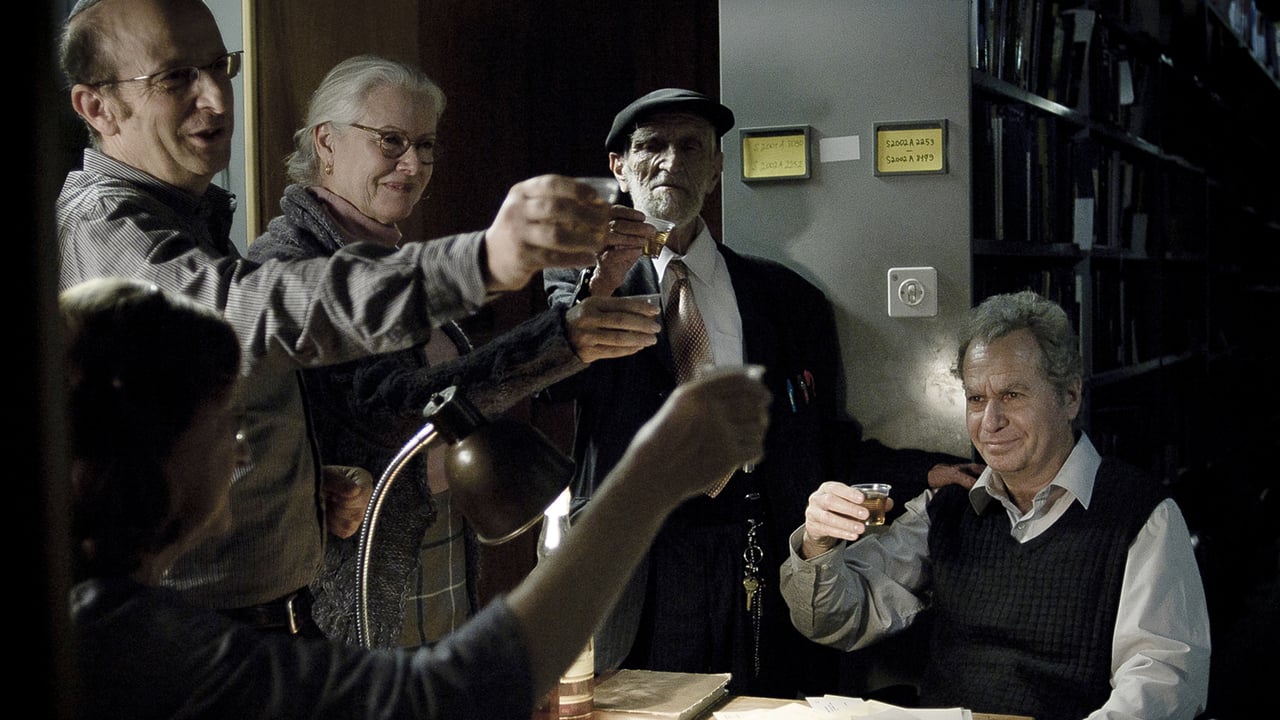

It isn't all that great, actually. Really cheesy and very predicable of how certain scenes are gonna turn play out. However, I guess that's the charm of it all, because I would consider this one of my guilty pleasures.
... View MoreYour blood may run cold, but you now find yourself pinioned to the story.
... View MoreOne of the most extraordinary films you will see this year. Take that as you want.
... View MoreStory: It's very simple but honestly that is fine.
... View MoreJoseph Cedar has written and directed a truly multifaceted film. "Footnote" is listed as a comedy, however, I found it to weigh more toward the dramatic side with a peppering of comedy that is well done and not overly utilized. The story is about a father and son who are prominent Talmudic scholars in Israel and who are competitive in the academic world where they both work. Shlomo Bar-Aba plays Eluezer Shkolnik the older of the two, and his performance is filled with struggle and empathy that pervades the film. The son is played by Lior Ashkenazi and he too provides a convincing portrayal as well. The family relationships are weighed heavily and transcend the entire movie which takes place in Academia. The film is rich in tradition, and the music complements it with great synchrony. The ending is abrupt, and it encourages some extra time thinking about the content. However, it also induces satisfaction in knowing that the cultural display of relationships and social intercourse are well documented on the screen. Some of the film dealing with comedy is not a belly splitter, but it is way of lightening the mood, and noted to be a well recognized mechanism of writing even in Shakespeare's writings. Although the relationship of the father and son is a strained one throughout the film, it also is a transcultural one that exudes with emotion and intellectual curiosity. This film is well worth a trip to the cinema or one can just wait for the Blu Ray DVD to be available.
... View MoreThe use of on screen checklists as the start of "Footnte" to establish the identities of the lead characters is a clever and engaging way to get the viewer in the mood for a humorous cinematic experience. The comic devices - the chair shuffling in the fatal meeting of the Israel Prize committee - evinces that sort of cruel but loving satire that made "Spinal Tap" such a rich experience. (If you don't like the comparison, check out the final scene in which Nigel, air guitaring the solo in "Sex Farm" - the song that has taken off on the Japanese charts - is called back on stage and back into the arms of the rejuvenated band)But then the mood of "Footnote" changes, with the spirited and dignified defense by the son of his father's worthiness for recognition. Nobility of spirit is a phrase that comes to mind. The viewer realizes that Cedar is a director and writer of substance. This satisfying realization is enhanced when the father's chief detractor relents in his opposition to the loyal son. And then Cedar once again changes the mood of the film, with the father's critical dismissal of the worth of his son's scholastic achievements. By this time the viewer is in no doubt as to the masterful direction and writing and is speculating on how the characters will work out the dramatic culmination of the film.I was reminded of "Ve'Lakhta Lehe Isha" ("To Take a Wife"), the 2004 film created by Ronit and Shlomi Elkaberz. "Footnore" is a lot more fun, a lot less harrowing but I recalled my "Eureka" moment while watching that film, when I realized it was a retelling of the biblical book of the prophet, Hosea. Had Cedar created a similar cinematic parable? Had Cedar tapped into some rich vein of cultural material to make a point, argue a thesis, establish some view of Israeli society?The expression, "Chekovian" came to mind. I was reminded of Sidney Lumet's 1968 cinematic recreation of "The Seagull". It remains for me the only re-working of the turn of the twentieth century Chekov's dramatic output that has ever really translated the validity of the characters and situations into the mindset of a mid to late twentieth century audience. Cedar has achieved a similar feat, in making the life experiences of modern Israelis intelligible to outsiders.The open ended culmination, the cryptic subtitle, "Professor Shkolnik's Revenge" leaves it open to the viewer to make the same mistake as the people who mixed up father and son when contacting the winner of the Israel Prize. Is the subtitle referring to the father of the son?The richness of the characterization makes the film a lot more satisfying than many of the films that criticize the values of Israeli society. Take for instance, "Lemon Tree", or even "Waltz With Bashir". Cedar gives us much more rounded and human (dare one say less caricatured) characters. But the viewer is left with the feeling that Cedar is saying something of substance about Israelis society. I was wrestling with this question as the film neared (but never fully enunciated) its dramatic climax.Is he saying that the elder generation or Israeli leadership is misguided in the way they govern? Is he saying that the next generation must value what is good in their parents, but seek to rectify the mistakes they have made? The way the film raises such questions marks it as a cinematic experience of great distinction as well as a thoroughly engrossing and satisfying way to spend time with characters of warmth, complexity and genuine decency
... View MoreGreetings again from the darkness. In the United States, we typically get limited access to the films of Israel. In recent years, there have been two that I like very much: The Band's Visit, and Waltz for Bashir. Written and directed by Joseph Cedar, Footnote was nominated for the Best Foreign Language Academy Award. It's a very creative and insightful story utilizing slight comedic elements to show the destructive forces of petty professional jealousy within a family.Most parents wish for true happiness for their children. If the professional success of their offspring far exceeds their own ... it is a reason to swell with parental pride. But what happens when father and son choose similar paths? What happens when animosity builds as the father's life work (30 years of research) is deemed unnecessary and irrelevant? What happens when the son becomes publicly revered and adored for his populist writing? Well, in the case of father Eliezer (Shlomo Bar-Aba) and son Uriel (Lior Ashkenazi), we get strained relations and a thesis on the pitfalls of pride and ego.All of that is sufficiently fascinating for a story, but here we get an even more severe test of human nature. The father is erroneously informed that he has won the prestigious Israel Award, providing vindication and meaning to his work and well, his being. See, the award was supposed to go to the other Professor Shkolnik ... yes, his son. This much is shown in the trailer, but the true guts of this story is what happens after this mistake.There are a few tremendous scenes in the film, but two really jumped out for me. In an early scene, the son is receiving yet another reward and he is attempting to provide some credit for his father's inspiration. However, the words seem to add credence to the irrelevancy instead. The best part? The camera never leaves the face of the father and he sits quietly listening in immeasurable pain. The other scene takes place in a beyond cramped meeting room for the Award committee to discuss the mistake with Uriel. The manner it is filmed and the choreography more than make up for the fact that the group of brilliant people never thought to find a more suitable meeting place.The score of the film is one that I would appreciate more without having the film playing. The music is wonderful, but often distracting to the moment. It is interesting to note how it changes along with the posture and walking pace of Eliezer after he is informed of his award. One need not be an academic researcher or writer to understand the damaged relationship between father and son ... and how it has impacted wives, mothers and sons. That's a story that is painful in any language.
... View More-- www.Ramascreen.com --FOOTNOTE is an Israeli film that's Oscar-nominated this year for Foreign language category and I can see why it received the nod. It's quite possibly one of the funniest rivalry stories I've ever watched, and what makes the dilemma even more complicated is that it's between father and son. I think it's a well-made film, it's funny, it has its charms, you'll enjoy writer/director Joseph Cedar's way of telling you the backstories of each character, some of the scenes interestingly move like microform reel, those of us who didn't grow up knowing anything about Talmud or Jewish culture would get a slight education on one of some of the things they regard highly over there, but halfway through the film, it loses its attraction, it doesn't engage you enough, and ultimately it ends itself in somewhat of a tactless manner Eliezer is the father and Uriel is the son and they both share the same last name, and that's where the misunderstanding plays its card. Both individuals dabble in the same literature but the father is old-school and stubborn and even though the film doesn't come out and say it, he may also suffer from some kind of autism or something that keeps him from desiring any social contact unless it's meant to celebrate him, or perhaps he's just introverted to the extreme. The son is more progressive, people are fond of him, and he enjoys the success that his father has always wishes he had. So when a certain prestigious award mistakes one for the other, Uriel is faced with the dilemma of what is the right thing to do. After he makes his decision, his father goes off and discredits his son's work. It's a pretty sad and tough family dynamics, if you think about it, because on the father's case, it's envy that turns into bitterness that turns into gloat, on the son's side it's wanting to live up to his father that turns into generosity that turns into feelings betrayed. Writer/director Cedar designs it so that things would escalate to the point where there is no other option but to openly confront each other, although oddly enough, the film never gives us that luxury.The comedy aspect of it is very enjoyable, Cedar takes us through awkward room sizes and you'll get the giggles from watching Elizer putting on his giant headset, shutting everything around him down just to get some silence, and for the old professors roles, Cedar casts actors who look just like the stereotype, they look unintentionally amusing. Embedded in the competition is also a the theme of whether or not you are your father's son or if you are your own person. Uriel seems distraught and offended when his own son doesn't make any effort to win his love, like he used to do with his own father. Both Eliezer and Uriel are obsessed with the idea that success can only be found in one's achievements and accomplishments and the recognition from your peers, and how one can be better at that than everybody else, so much so that they're missing out one what's truly important, each other. I think FOOTNOTE is a very unique family dynamics film that deserves attention at the very least.-- www.Ramascreen.com --
... View More